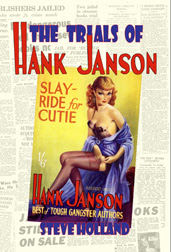Prosecuting the case
for the County Solicitor, Mr. P. Prideaux stated by Ronald Gomer was
the ringleader of the three men charged. He held the post of organist
and choirmaster at a church and had been in the habit of befriending
other members of that church and bringing them to his house in Wimborne.
The
earliest acquaintance was Harold Miller, who he befriended as far back
as 1929. Gomer used to stay at Miller's parents' house in Winton when he
went over to perform church duties at the weekend. Gomer also struck up
acquaintance with three choir boys, befriended them, and asked them to
come to his house.
Having no desire to see others get
into trouble, Gomer made a statement in which he explained very fully
his mode of life—how he came to commit the acts and the circumstances in
which photographs were taken and letters written. Det.-Sgt. Fudge, of
Wimborne, gave evidence that a search of Gomer's house had resulted in
the discovery of 17 negatives, which were subsequently developed.
Gomer,
later described as a man of artistic temperament, had been the organist
and choirmaster at a Bournemouth church for 26 years. An only child, he
had developed an early interest in music and he later earned a living
teaching music and as an organist at local churches. He attributed his
behaviour chiefly to "a sense of loneliness"—following the death of his
parents in 1932 he had "more or less" lived alone and devoted himself to
his interests in music, poetry and art. He had produced a masque at
Wimborne in 1934 and published some small books of poetry.
He
had known Francis (Frank) Hart for some years and they had taken their
holidays together. Hart was born in Wimborne and had been employed as an
assistant teacher to a local school where he remained for 15 years.
Early in 1941, he became headmaster of a school in Dorchester and had
given every satisfaction in his employment and spent many hours in work
of national importance. Since boyhood he had been a member of the church
choir and had been very active in matters connected with the church.
For 15 years he held the position of a Scoutmaster.
Hart
and Gomer visited each other's homes, playing cards. During the trial,
Gomer was described as having done excellent work in connection with
church matters, having been vestry clerk at a Wimborne church, chairman
of a Scout troop at the Bournemouth church, and honorary secretary of
the Wimburnians Association. Everyone spoke very highly of his energies
in these directions.
However, at his trial, Mr. Justice
Lawrence said that "I have no doubt that you, Gomer, were principally
responsible," when passing sentence. Gomer, for his part, had said that
when taking the photographs, that it was all treated as a joke. At the
time of the acts, he said, their seriousness did not register in his
mind and, of the 81 letters he had written to Harold Miller, he admitted
that quite a number were indecent, but they were intended to be read
only by Miller.
Miller, a native of Oldham, had worked
as a clerk before joining the R.A.F. in 1940. He was an energetic worker
connected with a Bournemouth church, being sacristan and Scoutmaster
for the church troop. He had first met Gomer at the age of 17 but
nothing had happened between them until 1938. Gomer had shown a keen
interest in his welfare and, whilst unemployed for short periods, had
received financial assistance from his friend. Commenting on the
letters, Miller said he believed they were a "mere fabrication of a
lonely mind."
Mr. J. B. Carson, for Gomer, described
how the latter believed he suffered a "medical kink" and that he had
expressed a desire to try and undergo some treatment to stop these
tendencies. Carson asked for leniency in view of the fact that this was
so much a medical case.
Mr. Justice Lawrence clearly
disagreed and on 19 January 1942 sentenced Gomer to three years penal
serviture. Hart and Miller each received six months imprisonment in the
second division. At trial, all three had pleaded guilty.
Subscribe to:
Post Comments (Atom)























































No comments:
Post a Comment